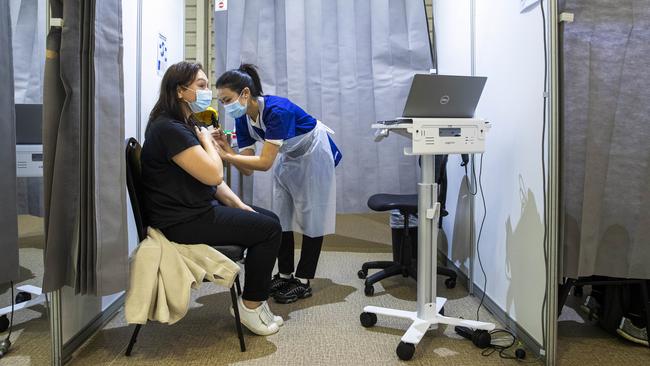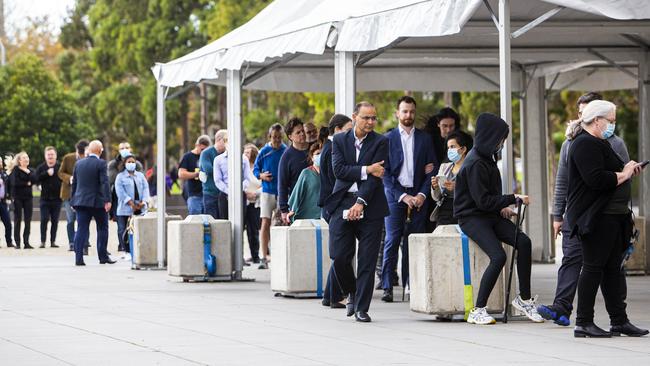The number of Aussies who don’t want a Covid jab has soared
Vaccine hesitancy has increased in the past three months, especially among three particular groups.
Coronavirus
Don't miss out on the headlines from Coronavirus. Followed categories will be added to My News.
Exclusive: Resistance to Covid-19 vaccination has soared in the last three months among younger women, single mums and parents with young children.
Fear of the rare blood clots associated with the AstraZeneca jab has driven the increased hesitancy with 58 per cent of unvaccinated Australians concerned about side effects.
A new survey has found the number of people outright rejecting the vaccines has leapt from 13 per cent of the population in January to 17 per cent in May.
The percentage who say they were “likely” to get the vaccine has dropped from 24 per cent in January to 15 per cent in May.
However, the good news is 23 per cent of those surveyed said they had already had the jab and 28 per cent said they were “very likely” to get it – a total of 51 per cent.
In January before the rollout even began only 44 per cent of people said they were “very likely” to get the jab.

Interestingly, 43 per cent of hesitants were ‘not at all worried’ about catching Covid-19 and many wanted to gain natural immunity to the virus.
This is even though you are 35 times more likely to die from Covid-19 than you are to die from blood clots due to the AstraZeneca vaccine.
The online survey of 2006 people by the Growth Intelligence Centre found 34 per cent of Australians were resistant or hesitant about getting the vaccine, up from 32 per cent in January.
The biggest drivers of Aussies feeling less favourable about the vaccine were fears around blood clotting (58 per cent), side effects (58 per cent), long term impacts (49 per cent), death risks (41 per cent), ineffective against new strains (40 per cent).
The biggest growth in hesitancy was among single mothers. In January only 43 per cent were thinking twice about having the jab but by May 61 per cent were wary.
Only 41 per cent of females aged 18-34 were hesitant about the vaccine in January but by May 50 per cent were worried.
Hesitancy among the unemployed grew from 45 per cent in January to 54 per cent in May.
Among women aged 35-44 vaccine hesitancy leapt from 40 per cent in January to 44 per cent in May.
Among “don’t know voters” vaccine hesitancy grew from 45 per cent in January to 50 per cent in May.
Men 18-34 shifted to become more favourable to vaccination motivated by the ability to continue working.

Confidence in the vaccine has waned in the last three months with 28 per cent of people no longer confident in the safety and efficacy of the vaccines (up from 24 per cent in January)
Queenslanders were the most hesitant about vaccination driven by increase in rejectors (up from 17 per cent to 22 per cent).
Hesitance remains the lowest in Victoria and NSW.
Health Minister Greg Hunt on Friday urged more Australians to get the jab because they were safe and effective.
“Australians are stepping forward and I want to thank them. There were record numbers in each of the last three weeks,” he said.
The nation’s peak medical bodies are also telling reluctant Australians that the benefits of vaccination far outweigh any risks.
Council of Presidents of Medical Colleges Chair Dr Kym Jenkins said side effects were very rare.
“Australia’s frontline doctors, who know the risks of COVID-19, have come forward in large numbers to receive either the Oxford-AstraZeneca or Pfizer-BioNTech COVID-19 vaccines,” Dr Jenkins said.
MEASURES THAT WOULD MAKE TRAVEL SAFER
Three quarters of vaccinated Australians intend to travel within Australia or overseas in the next 12 months, a new survey has found.
By contrast, more than half (54 per cent) of those rejecting the jab are not planning any trips in that time frame, according to the online survey by the Growth Intelligence Centre.
Leisure holidays are the main reason people want to travel interstate or overseas.
Catching up with family and friends or celebrating a significant event like a wedding or significant birthday was the second motivator for travel.

Forty per cent of people said thorough cleaning of planes, flexible fares and no cancellation fees were key to enticing them to travel.
A third said cleanliness of accommodation, making it compulsory to get vaccinated to travel and mandatory face masks would increase their confidence in travelling.
Four in ten international travellers intend on going to New Zealand, 31 per cent want to go to Europe.
Health and quarantine concerns and fear of being stranded overseas are the key reasons people say they don’t intend to travel.
These fears are more important to people likely to get the jab than people who say they will not get vaccinated.





